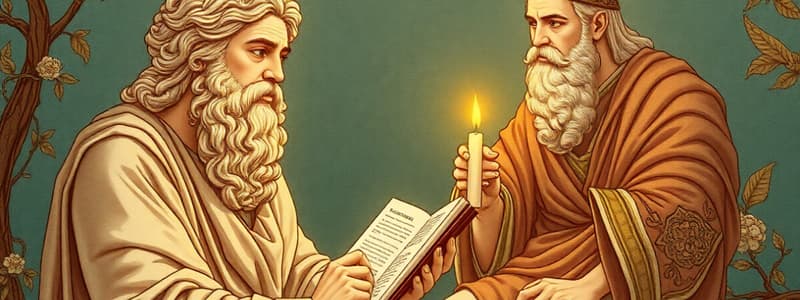Podcast
Questions and Answers
What does Socrates imply about Meno's previous speeches on virtue?
What does Socrates imply about Meno's previous speeches on virtue?
- They were well-received by audiences but lacked depth. (correct)
- They were insightful, but Socrates believes there's more to be explored.
- They were intellectually stimulating and thought-provoking.
- They were deceptive and lacked sincerity.
What is the primary reason Socrates questions Meno about the nature of virtue?
What is the primary reason Socrates questions Meno about the nature of virtue?
- To expose Meno's ignorance and make him feel foolish.
- To demonstrate his own superior knowledge of virtue.
- To understand Meno's personal definition and build upon it. (correct)
- To entertain himself and the audience with philosophical debate.
What does Meno's reaction to Socrates' questions suggest about him?
What does Meno's reaction to Socrates' questions suggest about him?
- He is confident in his understanding of virtue.
- He is intellectually curious and eager to learn.
- He is frustrated by Socrates' relentless probing. (correct)
- He is dismissive of Socrates' methods and insights.
What is the significance of the metaphor of the torpedo fish in the passage?
What is the significance of the metaphor of the torpedo fish in the passage?
What is Socrates' attitude toward Meno's concern about being accused of sorcery?
What is Socrates' attitude toward Meno's concern about being accused of sorcery?
According to Socrates, what is the benefit of images for handsome men?
According to Socrates, what is the benefit of images for handsome men?
Why does Socrates say he will not draw an image of Meno?
Why does Socrates say he will not draw an image of Meno?
What is the primary purpose of the dialogue between Socrates and Meno?
What is the primary purpose of the dialogue between Socrates and Meno?
What is the main subject of debate explored in the dialogue 'Meno'?
What is the main subject of debate explored in the dialogue 'Meno'?
In the dialogue, what is the role of Anytus?
In the dialogue, what is the role of Anytus?
How is the dialogue 'Meno' different from other 'Socratic' dialogues?
How is the dialogue 'Meno' different from other 'Socratic' dialogues?
What is the purpose of the geometrical problem involving the slave in the dialogue?
What is the purpose of the geometrical problem involving the slave in the dialogue?
What is the 'paradox' that Meno presents to Socrates?
What is the 'paradox' that Meno presents to Socrates?
How does Socrates respond to Meno's 'paradox'?
How does Socrates respond to Meno's 'paradox'?
According to the passage, what is Meno's character like?
According to the passage, what is Meno's character like?
How does the dialogue 'Meno' conclude?
How does the dialogue 'Meno' conclude?
What does Socrates suggest about the nature of the soul in relation to knowledge?
What does Socrates suggest about the nature of the soul in relation to knowledge?
What is the primary focus of Socrates and Meno's discussion?
What is the primary focus of Socrates and Meno's discussion?
What does Socrates argue is necessary for becoming better individuals?
What does Socrates argue is necessary for becoming better individuals?
How does Socrates view the act of seeking knowledge?
How does Socrates view the act of seeking knowledge?
What is the correct length of the line that the eight-foot square is based on according to the dialogue?
What is the correct length of the line that the eight-foot square is based on according to the dialogue?
What does Meno propose regarding the nature of virtue?
What does Meno propose regarding the nature of virtue?
How does Socrates characterize the process of Meno's recollection of knowledge?
How does Socrates characterize the process of Meno's recollection of knowledge?
What method does Socrates allude to for investigating concepts?
What method does Socrates allude to for investigating concepts?
What assumption does Meno want to start with regarding virtue?
What assumption does Meno want to start with regarding virtue?
According to Socrates, what is the result when someone realizes they do not know something?
According to Socrates, what is the result when someone realizes they do not know something?
What does Socrates imply about Meno's initial confidence in knowing the length of the line?
What does Socrates imply about Meno's initial confidence in knowing the length of the line?
How does Socrates feel about Meno's attempts to take charge of the conversation?
How does Socrates feel about Meno's attempts to take charge of the conversation?
What mathematical operation does Socrates use to illustrate his point about the eight-foot square?
What mathematical operation does Socrates use to illustrate his point about the eight-foot square?
What does Socrates compare Meno's current understanding to?
What does Socrates compare Meno's current understanding to?
How many feet is the total area of a square that is three feet on each side?
How many feet is the total area of a square that is three feet on each side?
What conclusion does Socrates reach about the relationship between the two-feet, three-feet, and four-feet lines?
What conclusion does Socrates reach about the relationship between the two-feet, three-feet, and four-feet lines?
What does Socrates imply about knowledge when he discusses people's understanding of size?
What does Socrates imply about knowledge when he discusses people's understanding of size?
In the context of the discussion, how many equal figures does Socrates claim are contained within the sixteen-foot square?
In the context of the discussion, how many equal figures does Socrates claim are contained within the sixteen-foot square?
What realization does Socrates guide Meno towards regarding the four figures?
What realization does Socrates guide Meno towards regarding the four figures?
What geometric concept is Socrates using to illustrate his point to Meno?
What geometric concept is Socrates using to illustrate his point to Meno?
How does Socrates elicit understanding from Meno?
How does Socrates elicit understanding from Meno?
What does Socrates mean by asking if the line cuts each figure in two?
What does Socrates mean by asking if the line cuts each figure in two?
According to Socrates, what is the relationship of four to two when discussing the figures?
According to Socrates, what is the relationship of four to two when discussing the figures?
What does the completion of the sixteen-foot square demonstrate in Socratic dialogue?
What does the completion of the sixteen-foot square demonstrate in Socratic dialogue?
What is the length of each side of the square with an area of eight square feet?
What is the length of each side of the square with an area of eight square feet?
How many four-foot squares fit inside an eight-foot square?
How many four-foot squares fit inside an eight-foot square?
What is the relationship between the side length of a square and the area of the square?
What is the relationship between the side length of a square and the area of the square?
What is the area of a square with a side length of four feet?
What is the area of a square with a side length of four feet?
If you double the side length of a square, what happens to the area?
If you double the side length of a square, what happens to the area?
What conclusion does Socrates draw by the end of the conversation with Meno's student?
What conclusion does Socrates draw by the end of the conversation with Meno's student?
What is the main point Socrates is trying to make through his questioning of Meno's student?
What is the main point Socrates is trying to make through his questioning of Meno's student?
What is the meaning of Socrates' statement, 'You see, Meno, that I am not teaching the boy anything, but all I do is question him.'?
What is the meaning of Socrates' statement, 'You see, Meno, that I am not teaching the boy anything, but all I do is question him.'?
Flashcards
Meno
Meno
A young aristocrat from Thessaly, linked to Athenian interests.
Virtue
Virtue
A key theme in Meno; debated if it can be taught or is innate.
Socratic Method
Socratic Method
A form of cooperative argumentative dialogue used by Socrates.
Anytus
Anytus
Signup and view all the flashcards
Gorgias
Gorgias
Signup and view all the flashcards
Knowledge Paradox
Knowledge Paradox
Signup and view all the flashcards
Geometrical Problem
Geometrical Problem
Signup and view all the flashcards
Inconclusive Conclusion
Inconclusive Conclusion
Signup and view all the flashcards
Perplexity
Perplexity
Signup and view all the flashcards
Torpedo Fish Analogy
Torpedo Fish Analogy
Signup and view all the flashcards
Dialogue
Dialogue
Signup and view all the flashcards
Self-Examination
Self-Examination
Signup and view all the flashcards
Rhetoric
Rhetoric
Signup and view all the flashcards
Unawareness
Unawareness
Signup and view all the flashcards
Doubling Size
Doubling Size
Signup and view all the flashcards
Square Area Formula
Square Area Formula
Signup and view all the flashcards
Eight-foot Square
Eight-foot Square
Signup and view all the flashcards
Line Length Relation
Line Length Relation
Signup and view all the flashcards
Socrates' Teaching Method
Socrates' Teaching Method
Signup and view all the flashcards
Geometric Understanding
Geometric Understanding
Signup and view all the flashcards
Misconception of Proportions
Misconception of Proportions
Signup and view all the flashcards
Recollection in Learning
Recollection in Learning
Signup and view all the flashcards
Line Length
Line Length
Signup and view all the flashcards
Three Feet
Three Feet
Signup and view all the flashcards
Square Area Calculation
Square Area Calculation
Signup and view all the flashcards
Nine Feet Area
Nine Feet Area
Signup and view all the flashcards
Socratic Realization
Socratic Realization
Signup and view all the flashcards
Perplexity's Value
Perplexity's Value
Signup and view all the flashcards
Knowledge Desire
Knowledge Desire
Signup and view all the flashcards
Four-foot figure
Four-foot figure
Signup and view all the flashcards
Base size relation
Base size relation
Signup and view all the flashcards
Equal figures
Equal figures
Signup and view all the flashcards
Addition of figures
Addition of figures
Signup and view all the flashcards
Cutting lines
Cutting lines
Signup and view all the flashcards
Geometrical reasoning
Geometrical reasoning
Signup and view all the flashcards
Immortal Soul
Immortal Soul
Signup and view all the flashcards
Knowledge Recollection
Knowledge Recollection
Signup and view all the flashcards
Seeking Truth
Seeking Truth
Signup and view all the flashcards
Nature of Virtue
Nature of Virtue
Signup and view all the flashcards
True Opinions
True Opinions
Signup and view all the flashcards
Recollection
Recollection
Signup and view all the flashcards
Seeking Knowledge
Seeking Knowledge
Signup and view all the flashcards
Socratic Inquiry
Socratic Inquiry
Signup and view all the flashcards
Hypothesis in Inquiry
Hypothesis in Inquiry
Signup and view all the flashcards
Conversation with Meno
Conversation with Meno
Signup and view all the flashcards
Study Notes
Meno Dialogue
- Meno's Family: One of the leading aristocratic families in Thessaly, traditionally friendly to Athens.
- Meno's Career Aspirations: A young man about to pursue an unscrupulous military and political career.
- Meno's Question: Interested in whether virtue can be taught, or is innate, acquired through practice, or inherited.
- Socrates' Method: Uses a dialectical approach; questions Meno and a slave to explore the nature of virtue.
- Geometric Problem: Socrates engages the slave in a geometrical problem; solving it through guided questioning reveals innate knowledge.
- Immortality of the Soul: Socrates suggests that the soul is immortal and possesses all knowledge prior to birth—recollection.
- Virtue as Knowledge: Socrates proposes that virtue is knowledge, leading to the conclusion that virtue can be taught.
- Relationship Between Virtue and Wisdom: Socrates argues that virtue is inseparable from wisdom.
- The Nature of Virtue: Meno and Socrates discuss various possible definitions of virtue (e.g., managing households, leading cities), concluding that virtue is a composite of qualities.
- Practical Application (Ethics): Discussion turns to practical application of virtue, including whether virtuous individuals can effectively convey it in instruction.
- Socratic Method: Involves persistent dialogue via questions, aiming for deeper understanding, leading to questioning assumptions.
Slave Boy's Recollection
- Geometric Problem: The slave boy is asked a question about doubling the area of a square.
- Guiding Questions: Socrates guides the boy through questions to help them discover the answer.
- Process of Exploration: The boy, through questioning, begins to grasp the relationship between sides and areas.
- Unconscious Knowledge: Socrates emphasizes that the boy's responses reveal latent knowledge that was already within him.
- Recollection: Suggests knowledge is pre-existent and passively recalled through appropriate questioning not learned.
The Soul and Recollection
- Immortality: The soul is eternal (never destroyed) and has seen everything: lives multiple times.
- Pre-existence: The soul's knowledge is pre-existent and not acquired during life.
- Recollection (anamnesis): By philosophical questioning, dormant knowledge within the soul is recalled.
- Moral Application: This concept applies to moral knowledge analogous to mathematical truths. Knowledge is intrinsically present and can be stimulated by questions.
Studying That Suits You
Use AI to generate personalized quizzes and flashcards to suit your learning preferences.




